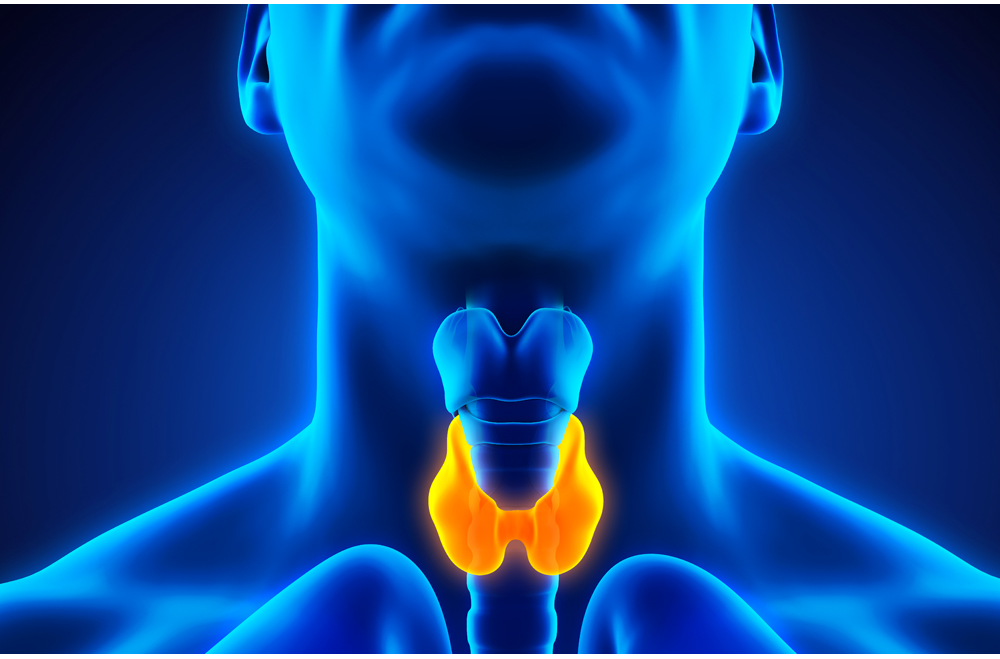How to prevent and relieve thyroid disorders?

It is not a coincidence of nature if the thyroid gland is located at the level of the neck since it ensures the balance between the top and the bottom of the body, between the head with our inner thoughts and the body with our external actions. It is the gland of our metabolism and it has the enormous power to make us work in over-revving or, on the contrary, in slow motion according to our emotions. In summary, the essence of biological decoding of thyroid disorders in one word: time.
The thyroid, located in the front of the neck, is a gland that makes hormones rich in iodine. The 2 main hormones secreted by the thyroid are :
• T3 (triiodothyronine)
• T4 (tetraiodothyronine or thyroxine).
Both include the term "iodo" because iodine is one of their component, indispensable for their production. The amount of hormones produced is under the control of other glands, located in the brain: the hypothalamus and the pituitary gland.
The hypothalamus directs the pituitary gland to produce the hormone TSH (for thyroid stimulating hormone). In turn, the hormone TSH stimulates the thyroid to produce thyroid hormones, including T3 and T4.
It is not a coincidence of nature if the thyroid gland is located at the level of the neck since it ensures the balance between the top and the bottom of the body, between the head with our inner thoughts and the body with our external actions. It is the gland of our metabolism and it has the enormous power to make us work in over-revving or, on the contrary, in slow motion according to our emotions. In summary, the essence of biological decoding of thyroid disorders in one word: time.
People with thyroid conditions have a problem with time. If I feel that the weather is going too fast, that everything is going too fast, that I am suffocated by my life, I risk hyperthyroidism. On the contrary, if I feel that time is running out too slowly, if I have a tendency to resignation or a victim attitude to events, I risk hypothyroidism.
THE MAIN DISEASES OF THYROID
Hypothyroidism
Hypothyroidism is the slowdown. Hypothyroidism is due to too little secretion of thyroid hormones in our body because of a malfunction of the thyroid gland.
The symptoms are:
• decreased heart rate,
• unexplained weight gain,
• high chills,
• constipation,
• lack of energy,
• general asthenia both physical and intellectual.
Hyperthyroidism
Hyperthyroidism is acceleration. Hyperthyroidism is due to too much secretion of thyroid hormones in our body. This excess of hormones leads to an acceleration of all metabolisms: everything works too much and too fast. The symptoms are mainly nervous (anxiety, agitation, irritability, trembling of hands) and heart (palpitations, tachycardia, extrasystoles). There is also unexplained weight loss, muscle fatigue, excessive sweating and frequent diarrhea.
Goiter
Goiter can reveal hyperthyroidism or hypothyroidism. Goiter is a thyroid volume that is higher than normal.
There are three kinds of goiter:
• Goiter secreting too much thyroid hormone.
• Goiter secreting too little thyroid hormone.
• Simple goitre secreting neither too much nor too little thyroid hormone.
Thyroid nodule
A nodule is a kind of ball more or less voluminous attached to the thyroid gland, which is detected on palpation. In 90 to 95% of cases, it does not contain cancer cells. A cytopuncture makes it possible to determine the benign or malignant character.
HOW TO DETECT A THYROID PROBLEM
Hypoactivity or hyperactivity of the thyroid gland can be detected by taking blood to measure the level of TSH in the blood.
In case of hypothyroidism, the TSH level is high because the pituitary gland reacts to the lack of thyroid hormones (T3 and T4) by secreting more TSH. In this way, the pituitary gland tries to stimulate the thyroid to produce more hormones.
In a situation of hyperthyroidism (when there are too many thyroid hormones), the opposite happens: the TSH level is low because the pituitary gland perceives the excess of thyroid hormones in the blood and stops stimulating the thyroid gland.
Even at the very beginning of a thyroid problem, the rate of TSH is often abnormal.
HYPOTHYROIDISM
Hypothyroidism is due to too little secretion of thyroid hormones in our body because of a malfunction of the thyroid gland.
In Canada, about 1% of adults suffer from hypothyroidism, with women being 2 to 8 times more affected than men. The prevalence of the disease increases with age, reaching more than 10% after 60 years14. In France, 3.3% of women and 1.9% of men are affected by hypothyroidism (source: HAS: summary of professional recommendations 2007).
The classic treatment for hypothyroidism is to replace the missing hormones by taking synthetic hormones (Levothyrox®).
Untreated, the disease can have serious long-term consequences. In adults, myxedema, a serious form of hypothyroidism, may occur. The symptoms of myxedema are a puffy face, a yellow color and a dry skin, which seems thickened. In severe cases, certain conditions (infection, cold, trauma, surgery, etc.) can lead to unconsciousness or "myxedema" coma. In addition, studies suggest that people who have been in a state of hypothyroidism for many years are at higher risk for cardiovascular disease.
In the untreated child, there are significant delays in growth and irreversible intellectual development, commonly called cretinism. Adequate treatment undertaken promptly usually helps to avoid complications and sequelae.
Causes
Before the 1920s, iodine deficiency was the leading cause of hypothyroidism. Iodine is a mineral micro-nutrient needed for the life and production of thyroid hormones T3 and T4. This is likely to change since the authorities are asking people to limit salt intake!
Nowadays, the main causes of hypothyroidism in the industrialized countries are:
Hashimoto's thyroiditis, a autoimmune disease which causes the destruction of the thyroid gland by the immune system.
Radioactive iodine therapy to treat hyperthyroidism or surgery to remove the thyroid gland (due to a nodule, tumor or thyroid cancer) causes permanent hypothyroidism in approximately 80% of cases Postpartum thyroiditis.
People at risk
• Women over 50 years old.
• People who have a personal or family history of thyroid disease or autoimmune disease (type 1 diabetes, celiac disease, rheumatoid arthritis, etc.).
• Women who gave birth during the year.
Symptoms
• Lack of energy and fatigue.
• Trouble sleeping
• Difficulty concentrating
• Dry skin and hair
• Depression
• Sensitivity to cold temperature
• Frequent, heavy periods
• Joint and muscle pain
Fatigue is the first symptom of a thyroid problem. Asthenia (general exhaustion without effort) is found in 99% of cases of hypothyroidism. If you are tired all the time without any signs of infection, if you feel lethargic and have a hard time getting started in the morning, you may suspect hypothyroidism.
Risk factors
• Smoking during breastfeeding in particular.
• Nutritional deficiencies, particularly in iodine, selenium and zinc.
• Excess iodine.
• Taking certain medications, such as lithium, amiodarone, or medicines to treat hyperthyroidism.
• A very abundant consumption of goitrogenic foods like Brussels sprouts, cabbage, cauliflower, broccoli, kale, mustard greens, rutabaga, radish, horseradish, etc., cassava, sweet potatoes, soybeans, peanuts and millet.
Health recommendations
Diet
To produce thyroid hormones, the thyroid needs a sufficient amount of trace elements, especially iodine, selenium and zinc. A deficiency in any of these elements can slow down the functioning of the thyroid. Thus, it will focus on sea fish (tuna, anchovy, sea bream, mackerel, cod, sardines), seafood (oysters topped the list), algae and Brazil nuts. For a good intake of zinc, prefer beef and veal livers, beef or pork.
Physical exercise
Regular physical activity will improve the function of the thyroid gland as it stimulates the thyroid gland to produce hormones and increases tissue sensitivity to thyroid hormones. It is even more important for hypothyroid people who want to get rid of excess weight.
HYPERTHYROIDISM
Hyperthyroidism is due to too much secretion of thyroid hormones in our body. This excess of hormones leads to an acceleration of all metabolisms: everything works too much and too fast.
The impact of this increase in thyroid hormones on the tissues is called thyrotoxicosis.This dysfunction brings together a set of clinical manifestations including cardiac and neuropsychiatric.
Hyperthyroidism affects between 0.2 and 1.9% of the population depending on the country. In addition, it is 7 times more common among women.
Causes
The reasons for dysfunction of the thyroid gland are poorly known. Family terrain seems to play a role. But it can be due to an autoimmune thyroid disease, Graves' disease, often iodine overload, a thyroid tumor, or an early stage of an inflammation of the thyroid.
Diagnostic
On examination, the doctor sees and feels a goitre more or less important, which can be blowing and pulsatile. An exophthalmia is found in Graves' disease with a "tragic glare" of the gaze. The heart is fast and rhythm disorders are common (cardiothyrosis).
Symptoms
• Anxiety
• Nervousness and irritability
• Difficulty sleeping
• Curved eyes "overflow" (in patients with Graves' disease)
• Brittle hair
• Hair loss
• Irregular heart rhythm (arrhythmia), especially in the elderly
• Changes in the menstrual cycle, including lighter bleeding and less frequent periods
• Rapid nail growth
• Acceleration of heart rate, usually more than 100 beats per minute
• Trembling hands
The symptoms are mostly nervous and heart. Weight loss is also observed despite increased appetite, muscle fatigue especially in the thighs and arms, excessive sweating and frequent diarrhea. Warning: it is not necessary to suffer from all these symptoms so that hyperthyroidism is diagnosed in our body. Indeed, each person is different. We know our body to know when something is wrong. It's up to you to be alert and listen.
Health recommendation
Diet
• Include vitamin A with foods like egg yolk, anchovies and cod liver oil.
• Prevent foods rich in vitamins B.
• Include the liver in the diet for vitamin A, B vitamins and iron.
• Include vitamin C with foods like kiwi, red pepper, citrus, papaya and cauliflower.
• Use healthy oils like avocado oil, coconut oil (to manage high cortisol and strengthen the anti-viral protection), butter (grass fed), duck fat and olive oil to reduce inflammation.
• Take the lemon balm to fight against nervousness and anxiety.
• Reduce polyunsaturated fats such as nuts, seeds, vegetable oil such as soy, canola and cotton, they are foods that promote inflammation in the body.
• Remove gluten, soy, peanuts and Solanaceae from the diet and all the foods that trigger auto-immunity.
• Combat inflammation with turmeric, organic berries, omega-3 fatty acids and eat green leafy vegetables.
Stress management
Reduce stress levels with activities such as yoga, acupuncture or relaxing massage therapy.
Basic advice
• Those who have hyperthyroidism should not use iodine because it could saturate the thyroid, which will aggravate their problems.
• Add 10 billion quality probiotics for a healthy intestinal flora.
• Avoid triggers such as stress, alcohol consumption, caffeine, smoking, poor diet and radiation (airports, x-rays).
• Strengthen the immune system with a powerful antioxidant such as alpha lipoic acid.
• Strengthen the adrenal glands which in turn strengthen the thyroid. They work hand in hand with each other.




Comments
Leave your comment